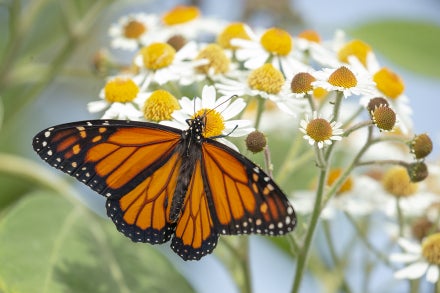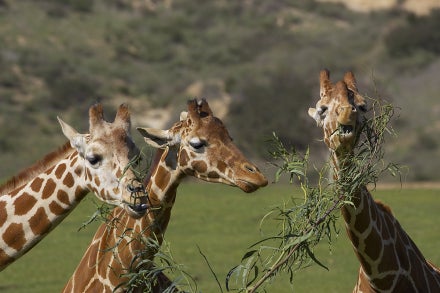
Zoo InternQuest is a seven-week career exploration program for San Diego County high school juniors and seniors. Students have the unique opportunity to meet professionals working for the San Diego Zoo, Safari Park, and Institute for Conservation Research, learn about their jobs, and then blog about their experience online. Follow their adventures here on the Zoo’s website!
 If you have a hankering for some baby animals, you may have found your destined career. But be prepared for cuteness overload and a lot of hard work. The Neonatal Assisted Care Unit is an elite group of five specialized keepers who provide medical care and support for newborn animals at the San Diego Zoo and the Safari Park. During the first week, interns had the opportunity to meet Kim Weibel, a member of that specialized team, to learn about the ins and outs of being a part of the Veterinary Services Department at the Zoo. Ms. Weibel helps newborn animals in the cases of injury, infection, maternal neglect or death, same species abuse, or inadequate milk supply.
If you have a hankering for some baby animals, you may have found your destined career. But be prepared for cuteness overload and a lot of hard work. The Neonatal Assisted Care Unit is an elite group of five specialized keepers who provide medical care and support for newborn animals at the San Diego Zoo and the Safari Park. During the first week, interns had the opportunity to meet Kim Weibel, a member of that specialized team, to learn about the ins and outs of being a part of the Veterinary Services Department at the Zoo. Ms. Weibel helps newborn animals in the cases of injury, infection, maternal neglect or death, same species abuse, or inadequate milk supply.
Ms. Weibel went to Iowa State University and studied Speech Communications and Zoology. She started at the San Diego Zoo as a tour guide, and then merged to education. She then transferred to the animal care department when she discovered there was an opening. In addition, Ms. Weibel took the opportunity to go to Africa for two years to study the mating habits of spotted hyenas. She said being a tour guide is what got her foot in the door toward working with animals at the Zoo.
One of the main points Ms. Weibel stresses about her job is the unpredictable shifts and long hours that are based on the animal's needs, similar to an emergency doctor at a hospital. But instead of working with two legged humans, she works with a vast array of species spanning from primates, to hoofstock and even marsupials. A large part of her job is helping animals until they are old enough to survive on their own. For instance, if carnivores or primates have been abandoned by their mothers, they can not thermoregulate which means they need to be put into incubators. Ms. Weibel explains that the kinds of incubators and enclosures used depend on the animal's stage in development. Incubators may depend on the size of the animal, and the kind of protection they need.
In addition, part of her job is making sure that the animals are properly nourished, which actually is a lot more work than one would think. She explained to us the importance of choosing the right kind of formula and nipple for the animals.
Nipples are not exactly one size fits all. Choosing the right nipple is based on the size of the animal's mouth, and the size of the hole in the nipple. Each animal has a specialized nipple that corresponds to what their mother's actual nipple looks like. The right size hole is important to make sure that the animals do not intake too much formula at once. This could cause the formula to be inhaled, which could lead to fluid in the lungs. Finding the right formula is just as specific as the right nipple. Being that mother's milk is the most ideal, part of Ms. Weibel’s job is finding the formula recipe that most closely resembles the nutritional value that the animal would receive from their mother.
Once you have the right kind of food and the tools to feed, then you need to figure out how much to feed the animals. Ms. Weibel states that a lot of her job requires math, but don't worry if you are not great with numbers. Ms. Weibel says anyone can do it with a calculator and the right equation. To prove this, she had interns actually calculate how much you would need to feed a young lesser kudu (a species of antelope). Once we had calculated the animal’s gastric capacity we measured and mixed the specific ingredients for the animal and attached the right nipple to the bottle. We watched as she fed the shy kudu who was a little nervous about our presence, but totally calm with Ms. Weibel. While she was feeding him she rubbed the animals behind with a towel, and explained that this was called stimulated defecation (Yes, that means poop and pee, let your laughs out now). A newborn animal cannot actually relieve themselves without the help of their mothers. Normally, the mom would lick the behind of her babies to help move things along (don’t ask your mom to do this at home, I promise she will not be amused).
Ms. Weibel’s advice is that if you are interested in working with animals, you must try and get as much hands-on experience under your belt as possible. You don't need to go to Africa and study wild hyenas to learn about the basic needs of animals. Taking biology classes, being the neighborhood dog walker, and even helping at your local shelter are all great ways to gain experience with animals. In addition, she recommends that applicants should have at least a college bachelor's degree that is focused around something biology related. Ms. Weibel says that her job is mentally and physically challenging, but if you are passionate about what you do the rewards always trump the hard parts of the job.
Teah, Careers Team Week One, Fall Session 2016




